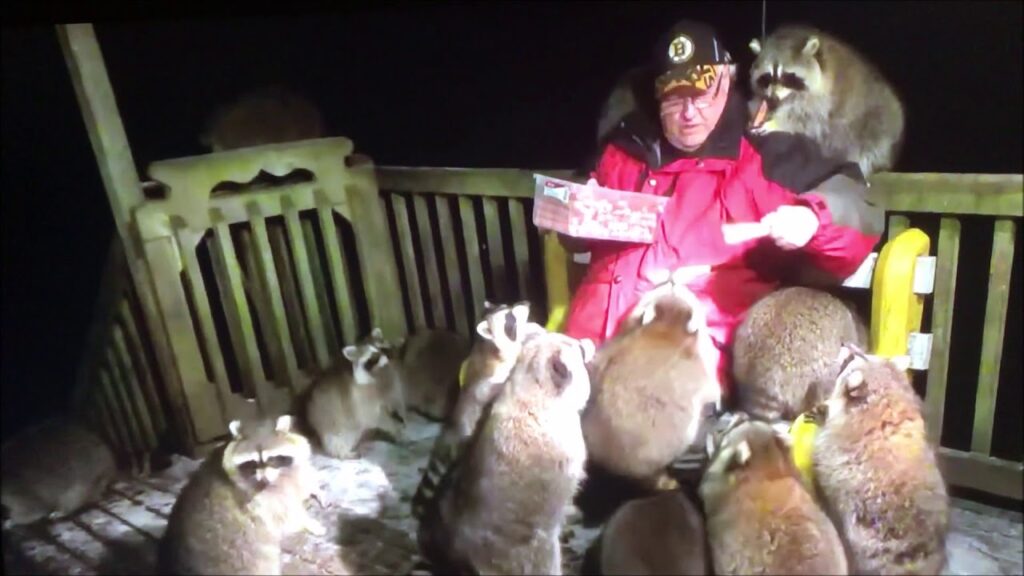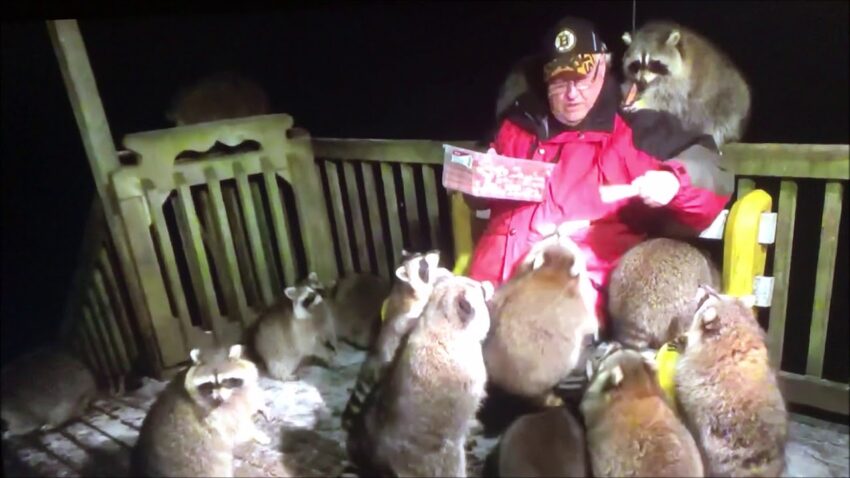
Guy Feeds Raccoons Hot Dogs: A Deep Dive into the Ethics, Legality, and Wildlife Impact
The image of a guy feeds raccoons hot dogs might seem amusing at first glance, a lighthearted interaction between humans and wildlife. However, this seemingly innocent act raises serious questions about animal welfare, ecological balance, and potential legal ramifications. This article delves deep into the complexities surrounding feeding raccoons hot dogs, exploring the ethical considerations, potential health risks for the animals, legal implications, and responsible alternatives. We aim to provide a comprehensive, expert-backed analysis to help you understand the true impact of this behavior and make informed decisions.
Understanding the Ramifications of Feeding Wildlife
Feeding wild animals, including raccoons, presents a multitude of problems. While the immediate gratification of observing these creatures up close might be tempting, the long-term consequences can be detrimental to both the animals and the ecosystem.
The Dangers of Human Food for Raccoons
Raccoons are opportunistic omnivores, meaning they’ll eat just about anything. However, their digestive systems aren’t designed to process processed human foods like hot dogs. Hot dogs, in particular, are high in sodium, fat, and preservatives, none of which are beneficial for raccoons.
- Nutritional Imbalance: Regularly feeding raccoons hot dogs can lead to nutritional deficiencies. They may become less inclined to forage for their natural food sources, which provide essential vitamins and minerals.
- Obesity and Related Health Problems: The high-fat content of hot dogs can cause obesity, leading to heart disease, diabetes, and joint problems in raccoons.
- Toxic Ingredients: Some hot dogs contain ingredients that are toxic to animals, such as garlic and onion powder.
- Dependence and Loss of Natural Foraging Behavior: Raccoons become reliant on humans for food, reducing their ability to find food on their own.
The Spread of Disease
Feeding raccoons can also contribute to the spread of diseases. Raccoons are known carriers of rabies, distemper, and other zoonotic diseases (diseases that can be transmitted from animals to humans). When raccoons congregate in large numbers at feeding sites, the risk of disease transmission increases significantly.
Disruption of Natural Ecosystems
Introducing artificial food sources into the environment can disrupt the natural balance of ecosystems. Raccoons that are fed regularly may become overpopulated in certain areas, leading to increased competition for resources and potential conflicts with other wildlife.
Legal Considerations Surrounding Feeding Raccoons Hot Dogs
In many jurisdictions, feeding wildlife is illegal or restricted. These laws are in place to protect both the animals and the public. The specific regulations vary depending on the location, but they often prohibit the intentional feeding of wild animals in public areas or on private property if it creates a nuisance or poses a threat to public health and safety.
Local Ordinances and State Regulations
Before feeding raccoons, it’s crucial to check local ordinances and state regulations regarding wildlife feeding. In some areas, fines and other penalties may be imposed on individuals who violate these laws. Ignorance of the law is not an excuse, so it’s essential to be informed.
Potential Liability for Damages
If a raccoon that you’ve been feeding causes damage to property or injures someone, you could be held liable. For example, if a raccoon becomes aggressive and bites a neighbor, you might be responsible for the medical expenses and other damages incurred by the victim.
Ethical Considerations: Is Feeding Raccoons Hot Dogs Morally Right?
Even if it’s legal to feed raccoons in your area, it’s important to consider the ethical implications of this behavior. While it may seem like a harmless act of kindness, feeding raccoons can have unintended consequences that harm the animals and the environment.
The Impact on Animal Welfare
As mentioned earlier, feeding raccoons human food can lead to nutritional deficiencies, obesity, and other health problems. By providing them with an unnatural diet, you’re essentially compromising their well-being.
The Disruption of Natural Behaviors
Feeding raccoons can also disrupt their natural behaviors. They may become less fearful of humans, which can lead to conflicts and potential harm to both the animals and the people. Additionally, they may become dependent on humans for food, reducing their ability to forage for their own sustenance.
Responsible Alternatives to Feeding Raccoons
If you’re concerned about the well-being of raccoons, there are many responsible alternatives to feeding them. These options focus on protecting their health and safety while minimizing the potential for negative impacts on the environment.
Protecting Your Property Without Feeding
If raccoons are causing problems on your property, there are several humane ways to deter them without resorting to feeding. These include:
- Securing Trash Cans: Use trash cans with tight-fitting lids and consider using bungee cords or straps to secure them further.
- Removing Food Sources: Clean up any fallen fruit or spilled birdseed in your yard.
- Sealing Entry Points: Seal any holes or cracks in your home’s foundation or siding to prevent raccoons from entering.
- Using Motion-Activated Lights or Sprinklers: These can startle raccoons and discourage them from entering your property.
Supporting Wildlife Conservation Efforts
Consider supporting local wildlife conservation organizations that are working to protect raccoons and their habitats. These organizations often conduct research, provide education, and advocate for policies that benefit wildlife.
Learning More About Raccoons
Educate yourself about raccoon behavior and ecology. The more you know about these animals, the better equipped you’ll be to coexist with them responsibly.
Expert Perspectives on Human-Wildlife Interactions
Wildlife biologists and conservationists overwhelmingly advise against feeding wild animals, including raccoons. They emphasize the importance of allowing animals to maintain their natural foraging behaviors and avoiding the creation of artificial food dependencies. According to leading experts in raccoon behavior, consistent feeding can lead to increased aggression and competition among raccoons, further disrupting the natural order.
Furthermore, the risks associated with disease transmission are significant. Concentrating raccoon populations through feeding increases the likelihood of outbreaks, potentially impacting both the raccoon population and domestic animals in the area.
Hot Dogs as a Symbol: The Broader Implications of Human Interference
The act of a guy feeds raccoons hot dogs, while seemingly isolated, represents a larger issue: the impact of human interference on wildlife. Our actions, whether intentional or unintentional, can have profound consequences on the natural world. By understanding these consequences and making responsible choices, we can help protect wildlife and preserve the integrity of ecosystems.
The Importance of Responsible Waste Management
One of the primary reasons raccoons are attracted to human environments is the availability of food waste. Improperly stored garbage provides an easy meal for these opportunistic creatures. By practicing responsible waste management, we can reduce the likelihood of raccoons entering our neighborhoods and prevent the need for direct interaction.
Best Practices for Waste Disposal
- Use Secure Containers: Ensure that your garbage cans have tight-fitting lids that cannot be easily opened by raccoons.
- Store Garbage Indoors: If possible, store your garbage cans in a garage or shed to prevent raccoons from accessing them.
- Clean Up Spills: Promptly clean up any food spills or crumbs around your property.
- Compost Responsibly: If you compost, ensure that your compost bin is properly sealed and located away from your home.
Debunking Myths About Raccoons
Many misconceptions surround raccoons, often leading to fear and misunderstanding. It’s important to dispel these myths to promote a more informed and respectful approach to coexisting with these animals.
Common Misconceptions
- Raccoons are inherently aggressive: Raccoons are generally shy and avoid contact with humans unless they feel threatened or are protecting their young.
- Raccoons are always rabid: While raccoons can carry rabies, not all raccoons are infected. Rabies is a serious concern, but it’s important to avoid generalizations.
- Raccoons are pests: Raccoons play an important role in the ecosystem, helping to control rodent populations and disperse seeds.
Q&A: Your Burning Questions About Raccoons and Human Interaction
- Is it ever okay to feed a raccoon? Generally, no. While seemingly harmless, feeding raccoons can lead to dependence, health problems, and increased aggression. It’s best to let them forage naturally.
- What should I do if a raccoon approaches me? Remain calm and slowly back away. Do not make sudden movements or try to touch the animal.
- How can I tell if a raccoon is sick? Signs of illness include lethargy, disorientation, difficulty walking, and excessive drooling. Contact animal control or a wildlife rehabilitator if you observe these symptoms.
- Are raccoons dangerous to pets? Raccoons can pose a threat to pets, especially smaller animals. Keep pets indoors or supervised when outside, particularly at night.
- What’s the best way to raccoon-proof my yard? Secure trash cans, remove food sources, seal entry points, and use motion-activated deterrents.
- Can I relocate a raccoon if it’s causing problems? Relocating raccoons is often illegal and can be harmful to the animals. It’s best to use humane deterrents to encourage them to leave on their own.
- What are the natural predators of raccoons? Predators include coyotes, foxes, owls, and large birds of prey.
- How long do raccoons live? In the wild, raccoons typically live for 2-5 years. In captivity, they can live much longer.
- Are raccoons nocturnal? Yes, raccoons are primarily active at night.
- What is a group of raccoons called? A group of raccoons is called a nursery.
Conclusion: Prioritizing Responsible Coexistence with Raccoons
The seemingly simple act of a guy feeds raccoons hot dogs unveils a complex web of ethical, legal, and ecological considerations. While the intention may be well-meaning, the long-term consequences can be detrimental to the health and well-being of these animals and the balance of the ecosystem. By understanding the risks associated with feeding raccoons and adopting responsible alternatives, we can promote a more harmonious and sustainable relationship with wildlife.
Remember, our actions have a direct impact on the natural world. Let’s choose to act responsibly and protect the delicate balance of our ecosystems. Share your thoughts and experiences with responsible wildlife interaction in the comments below. For further information on wildlife conservation and responsible stewardship, contact your local wildlife agency or conservation organization.

